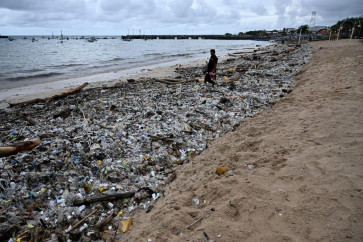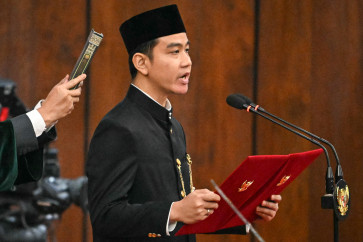Five projects qualify for research Olympic
Five researches conducted by Bali senior high-school students have been selected for the final stage of the 2011 National Students’ Research Olympic (OPSI)
Change text size
Gift Premium Articles
to Anyone

F
ive researches conducted by Bali senior high-school students have been selected for the final stage of the 2011 National Students’ Research Olympic (OPSI).
Four of the researches were produced by students at SMAN 3, a prestigious public senior high school in Denpasar, and one was submitted by students at Singaraja’s SMAN 1.
The annual OPSI is organized by the National Education Ministry. The ministry’s official website, www.siswapsma.org, stated that 1,300 researches had been submitted by students across the nation for the initial selection process.
The submitted researches covered three categories: Basic Science, Applied Science and Human Science. Only 90 researches made it to the final stage.
This year’s results are actually lower than those achieved by Bali students last year, when the island had nine researches qualify for the final stage.
Notable, however, is that two of the chosen researches were submitted by one team of students.
The team comprises SMAN 3 students Putu Ayu Yuni Artasari, Ni Made Nila Pertina Dewi and Ni Putu Ayu Astri Prana Iswara.
The team’s first research explores the usability of red lengkuas (Languas galanga) as a bio-pesticide to obstruct the growth of fungus on vanilla plants.
The second research investigates the use of waru (Hibiscus tiliaceus) as a cough medicine.
“It was quite a surprise for us. We never expected that both of our researches would qualify for the final stage,” Nila Pertina Dewi said.
The other team from SMAN 3 explored the production of liquid detergent.
The only human science research that made the final stage was conducted by SMAN 3’s Ni Putu Eka Sucipta Dewi and her friend. The research focuses on local wisdoms of behavioral harmony displayed by the residents of Penglipuran village in Bangli.
The students will fly to Jakarta early next month to present their respective researches before a panel of judges during the OPSI science fair.
“The most difficult challenge will be the poster presentation, because during that presentation we will receive questions not only from the judges but also from the attending spectators of the fair,” Astri Prana Iswara said.









